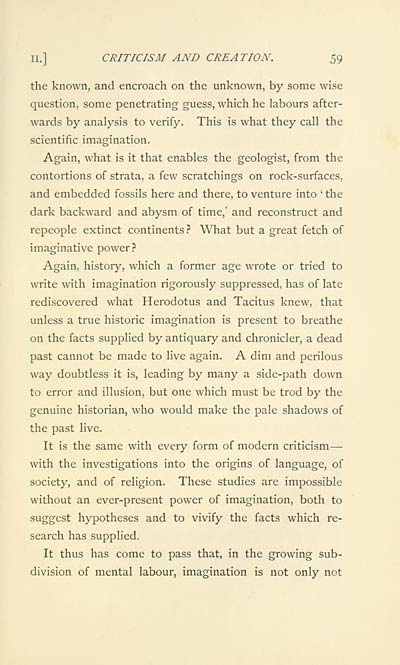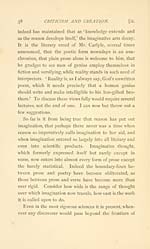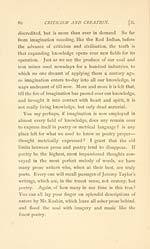Download files
Complete book:
Individual page:
Thumbnail gallery: Grid view | List view

II.] CRITICISM AND CREATION. 59
the known, and encroach on the unknown, by some wise
question, some penetrating guess, which he labours after-
wards by analysis to verify. This is what they call the
scientific imagination.
Again, what is it that enables the geologist, from the
contortions of strata, a few scratchings on rock-surfaces,
and embedded fossils here and there, to venture into ' the
dark backward and abysm of time,' and reconstruct and
repeople extinct continents ? What but a great fetch of
imaginative power?
Again, history, which a former age wrote or tried to
write with imagination rigorously suppressed, has of late
rediscovered what Herodotus and Tacitus knew, that
unless a true historic imagination is present to breathe
on the facts supplied by antiquary and chronicler, a dead
past cannot be made to live again. A dim and perilous
way doubtless it is, leading by many a side-path down
to error and illusion, but one which must be trod by the
genuine historian, who would make the pale shadows of
the past live.
It is the same with every form of modern criticism —
with the investigations into the origins of language, of
society, and of religion. These studies are impossible
without an ever-present power of imagination, both to
suggest hypotheses and to vivify the facts which re-
search has supplied.
It thus has come to pass that, in the growing sub-
division of mental labour, imagination is not only not
the known, and encroach on the unknown, by some wise
question, some penetrating guess, which he labours after-
wards by analysis to verify. This is what they call the
scientific imagination.
Again, what is it that enables the geologist, from the
contortions of strata, a few scratchings on rock-surfaces,
and embedded fossils here and there, to venture into ' the
dark backward and abysm of time,' and reconstruct and
repeople extinct continents ? What but a great fetch of
imaginative power?
Again, history, which a former age wrote or tried to
write with imagination rigorously suppressed, has of late
rediscovered what Herodotus and Tacitus knew, that
unless a true historic imagination is present to breathe
on the facts supplied by antiquary and chronicler, a dead
past cannot be made to live again. A dim and perilous
way doubtless it is, leading by many a side-path down
to error and illusion, but one which must be trod by the
genuine historian, who would make the pale shadows of
the past live.
It is the same with every form of modern criticism —
with the investigations into the origins of language, of
society, and of religion. These studies are impossible
without an ever-present power of imagination, both to
suggest hypotheses and to vivify the facts which re-
search has supplied.
It thus has come to pass that, in the growing sub-
division of mental labour, imagination is not only not
Set display mode to: Large image | Transcription
Images and transcriptions on this page, including medium image downloads, may be used under the Creative Commons Attribution 4.0 International Licence unless otherwise stated. ![]()
| Early Gaelic Book Collections > Ossian Collection > Aspects of poetry > (75) |
|---|
| Permanent URL | https://digital.nls.uk/78386172 |
|---|
| Description | Selected books from the Ossian Collection of 327 volumes, originally assembled by J. Norman Methven of Perth. Different editions and translations of James MacPherson's epic poem 'Ossian', some with a map of the 'Kingdom of Connor'. Also secondary material relating to Ossianic poetry and the Ossian controversy. |
|---|
| Description | Selected items from five 'Special and Named Printed Collections'. Includes books in Gaelic and other Celtic languages, works about the Gaels, their languages, literature, culture and history. |
|---|

